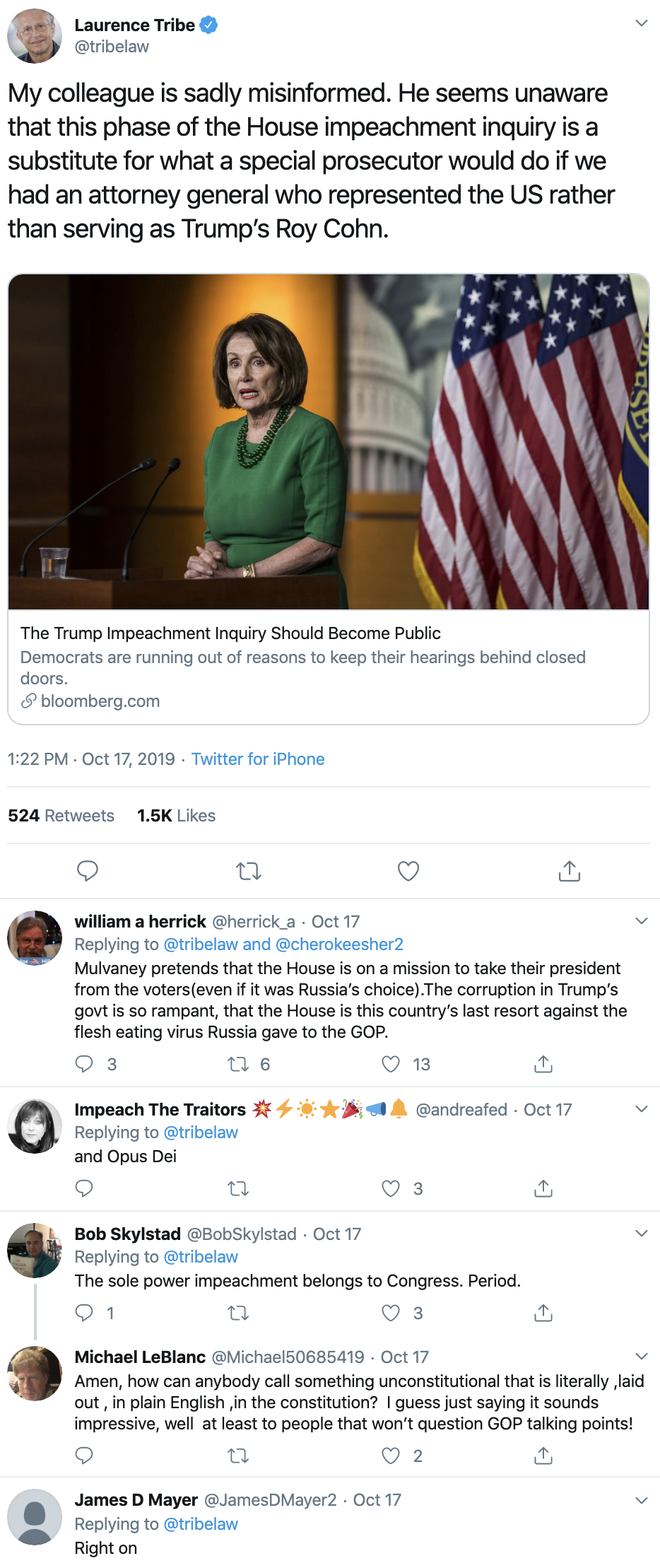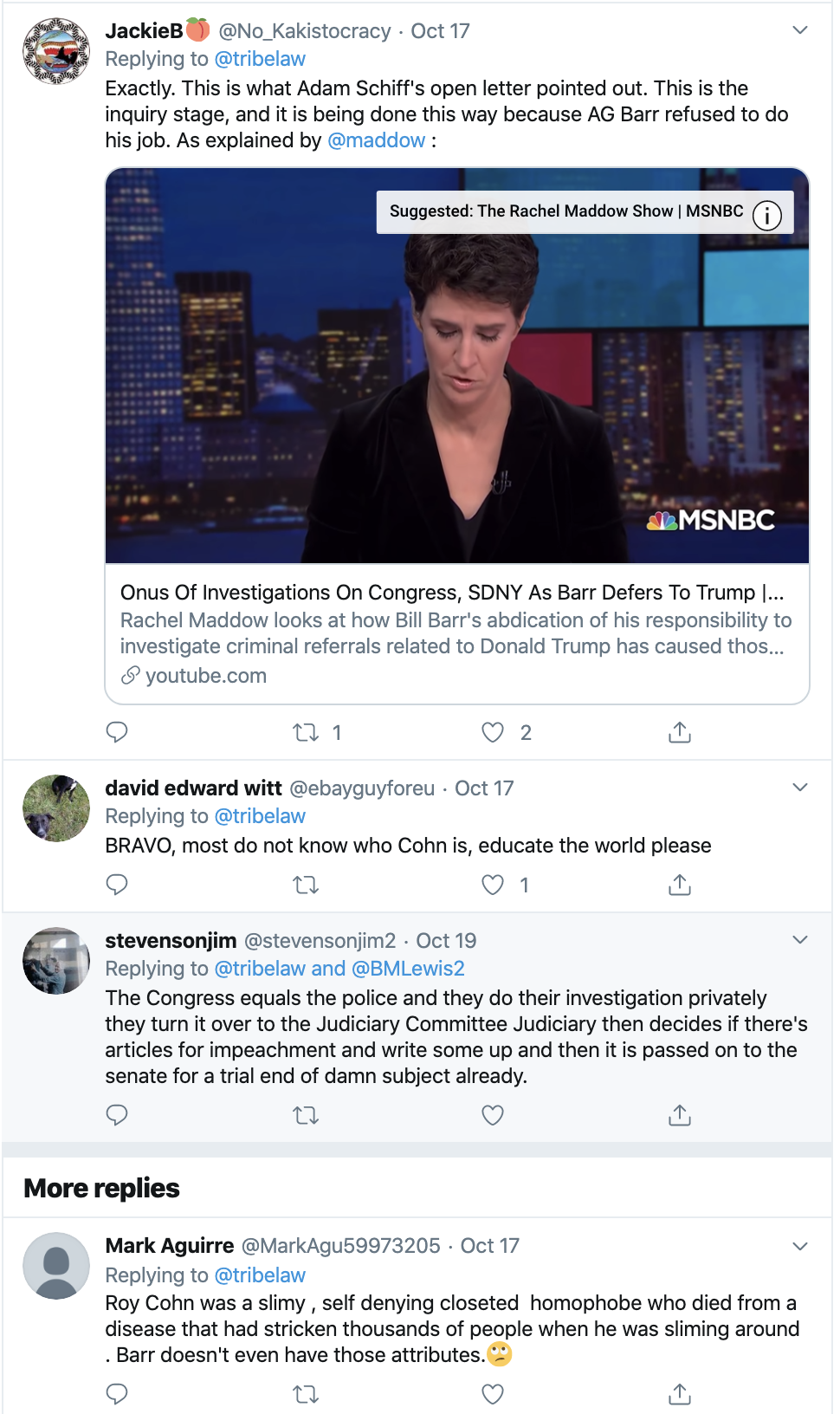Donald Trump famously asked his former Attorney General Jeff Sessions “Where is my Roy Cohn?” The man POTUS reference was one of Senator Joseph McCarthy’s top attorneys during his hunt for Communists and later worked for Trump. Then, he was disbarred, but it appears the president has found his Roy Cohn again.
The United States Department of Justice (DOJ) has always been defined by the Constitution. The New York City (NYC) Bar Association just called for Attorney General (AG) William Barr to recuse himself in the Ukraine investigation.
In its statement, the bar indicated that the AG was “allegedly involved.” Should that not appeal to Barr, the statement suggested he resign. If the AG did not want to resign, the NYC bar said he should be sanctioned “including possible removal by Congress.”
The statement continued explaining how the attorney general role was defined:
‘Since our democracy’s inception in 1789, its foundation has been the rule of law. Our leaders are selected and exercise their powers under law, beginning with our Constitution. Although our courts have primary responsibility for interpreting and applying our laws, both the Congress and the Executive – including the President – are subject to, and accountable under, the Constitution and the laws enacted thereunder.’
The associated said the attorney general’s responsibility was to “see that our laws are justly administered for the benefit of the American people.” Therefore, the AG has to be a role model for advising the president. In addition, he must:
‘[D]demonstrate an unquestioned commitment to compliance with law by all who exercise the powers of government…[T]he Attorney General’s obligations are not owed solely to “the Government as his client,” they are not owed to the President in his individual capacity.’
The statement said that the AG:
‘M]ust ensure that the administration of justice, the enforcement of the law is above and away from politics. Nothing could be more destructive of our system of government, of the rule of law or the Department of Justice as an institution than any toleration of political interference with the enforcement of the law.”’
The Bar Association reminded Barr that he took an oath as Attorney General:
‘”[The American people have to know that there are places in the government where the rule of law, not politics, holds sway and where they will be treated fairly based solely on the facts and the evenhanded application of the law. The Department of Justice must be that place.”‘
Then, the statement went into Barr’s performance. The organization did not give him a passing grade:
‘Mr. Barr’s actions in office have failed in precisely the role that he described with eloquence when nominated. That failure has jeopardized the confidence that the public can reasonably have in the DOJ as the place “where the rule of law, not politics, holds sway.” ‘
The statement continued, noting that he has expressed “loyalty to the president:”
‘His actions during his brief tenure in office have demonstrated to us that, contrary to the responsibilities of his office, he appears to view his primary obligation as loyalty to the President individually rather than to the nation. In serving the President, he has been willing to take or countenance actions that are contrary to the professional standards of the DOJ, his oath of office and his own obligations as an attorney.’
However, what sealed the deal for the organization was:
‘Mr. Barr’s failure to recuse himself from the DOJ’s review—itself of uncertain propriety—of the ongoing “whistleblower” complaint with respect to the President’s efforts during his July 25, 2019 telephone call to request the Republic of Ukraine to investigate Mr. Trump’s allegations of Ukrainian interference in the 2016 U.S. elections and former Vice-President Biden and his son (the “Ukraine Matter”).’
Then, the NYC Bar gave its evidence:
‘As White House records made clear, the President told his Ukrainian counterpart, Volodymyr Zelensky, that Mr. Barr “would be in touch with him” to follow up on the President’s requests. The whistleblower found this telephone call to be of “urgent concern” because of the President’s apparent intermingling of U.S. foreign policy interests with his personal political interests in apparent violation of U.S. law.’
Following that, the statement read that Barr should have “recused himself from any participation, direct or indirect.” It encouraged:
‘Attorney General to recuse himself from any participation, direct or indirect, in DOJ’s review of the whistleblower complaint. Regardless of whether Mr. Barr was in fact aware of or part of the President’s plans, either before, at the time of, or after the July 25, 2019 telephone call, it is clear that Mr. Barr was obligated to recuse himself from any involvement in DOJ’s review of either the whistleblower complaint or the substance of the President’s actions once the President offered Mr. Barr’s services to President Zelensky. ‘
The statement continued, going in to further evidence detail for its case:
‘Federal regulations (28 CFR 45.2) for DOJ prosecutors require recusal whenever a lawyer “has a personal or political relationship with any person . . . substantially included in the conduct that is the subject of the investigation.” The DOJ Manual for U.S. Attorneys requires (section 3-2.170, 2.220) recusal of U.S. Attorneys and Assistant U.S. Attorneys where “a conflict of interest exists or there is an appearance of a conflict of interest or loss of impartiality.” Executive Branch ethics rules also provide (5 C.F.R. 2635.502) that recusal is appropriate if “a reasonable person with knowledge of the relevant facts would be likely to question the employee’s impartiality in the matter.”’
The Mueller Report Adventures: In Bite-Sizes on this Facebook page. These quick, two-minute reads interpret the report in normal English for busy people. Mueller Bite-Sizes uncovers what is essentially a compelling spy mystery. Interestingly enough, Mueller Bite-Sizes can be read in any order.















